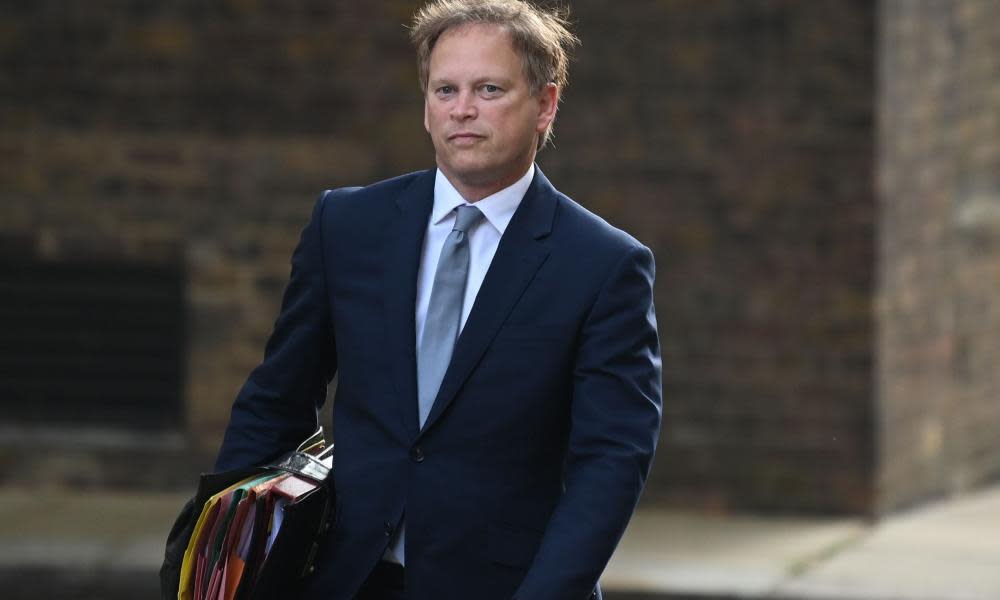Follow Covid rules or see UK deaths return to spring levels, minister warns

The UK could return to the levels of mass coronavirus deaths seen in the spring unless people abide by social distancing rules, Grant Shapps has warned ahead of an appeal to the public by the government’s most senior scientists.
Shapps, the transport secretary, said the country appeared to be on the same trajectory of new infections as countries such as Spain, and that without concerted action, could be faced with a significant increase in hospital admissions and then deaths.
“We’re seeing the hospital admissions creeping up, albeit the deaths haven’t followed as yet,” Shapps told Sky News. “What we do know, looking at places like Spain, is that will follow.”
The UK recorded 3,899 new cases on Sunday, with Shapps saying the new outbreak had started off concentrated in younger people. “It can never stay isolated to that age group, it always ends up spreading,” he said. “We’re in danger of spreading it around. We know where this ends. We’ve seen it earlier in the year.”
default
Shapps was talking before a televised address by the chief medical officer for England, Prof Chris Whitty, and the UK’s chief scientific adviser, Sir Patrick Vallance.
As Downing Street considers imposing nationwide curbs to contain a sharp rise in cases, the scientists will set out the latest data on the spread of the disease, and urge people to exercise caution.
Whitty is expected to say: “We are looking at the data to see how to manage the spread of the virus ahead of a very challenging winter period.”
The scientists would set out the current situation, Shapps said, and “later in the week” Boris Johnson would speak, potentially to outline any new measures. “Part of this depends on the way that we all, individually, respond.”
Asked about the task ahead, Shapps agreed that the UK was “certainly at a very critical moment”.
He said: “It is clear that we are just a few weeks behind what we are seeing elsewhere in Europe. You only have to look at what’s happening in France, and particularly Spain, and you can see that things have taken off there, including I’m afraid deaths.”
He added: “One of the difficult things about this is that the data lags behind what’s really happening. So you can’t tell whether the new rule of six, for example, is working immediately. And deaths in particular, the mortality rate, is the most lagging indicator of all. We can’t afford to wait until deaths are rising before taking action.”
Asked why Johnson was not speaking alongside the scientists on Monday, Shapps said the PM would speak later in the week to outline any possible new measures: “You won’t have to wait very long to hear from the prime minister.”
R, or the 'effective reproduction number', is a way of rating a disease’s ability to spread. It’s the average number of people on to whom one infected person will pass the virus. For an R of anything above 1, an epidemic will grow exponentially. Anything below 1 and an outbreak will fizzle out – eventually.
At the start of the coronavirus pandemic, the estimated R for coronavirus was between 2 and 3 – higher than the value for seasonal flu, but lower than for measles. That means each person would pass it on to between two and three people on average, before either recovering or dying, and each of those people would pass it on to a further two to three others, causing the total number of cases to snowball over time.
The reproduction number is not fixed, though. It depends on the biology of the virus; people's behaviour, such as social distancing; and a population’s immunity. A country may see regional variations in its R number, depending on local factors like population density and transport patterns.
Hannah Devlin Science correspondent
On Sunday, Matt Hancock, the health secretary, warned that Britain had reached a “tipping point” and did not rule out another national lockdown. In a series of blunt TV interviews, he said the public had a choice: comply with restrictions, including the “rule of six” limit on social gatherings, or stricter measures would be imposed.
“We face a choice. If everybody follows the rules – and we’ll be increasingly stringent on the people who are not following the rules – then we can avoid further national lockdowns,” he told the BBC’s Andrew Marr Show, on Sunday. “But we, of course, have to be prepared to take action if that is what is necessary. I don’t rule it out; I don’t want to see it.”


